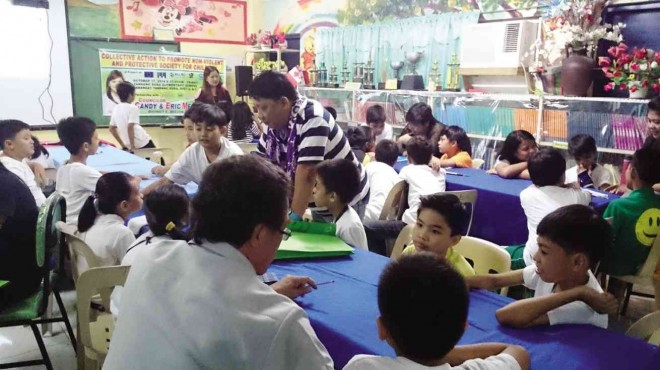No need to get physical to discipline

COMMUNITY paper editors and senior journalists interact with Tandang Sora Elementary School students after a lecture on
children’s rights. LINDA B. BOLIDO
More than two years after Quezon City—one of the first local governments to do so—passed an ordinance prohibiting bullying in schools and its environs, its main goal to prevent any form of harassment of students seems to be pretty well understood and accepted by some 40 Grade 6 and a smattering of Grade 5 students at Tandang Sora Elementary School (TSES) in District 6 of the city.
Whether it is because of media exposure, classroom discussions or information drives by organizations campaigning for the rights of children, the students seem to have a pretty good idea that the ordinance benefits them.
But getting them—and their parents—to accept a proposed Quezon City ordinance prohibiting corporal or physical punishment in and out of school may be another matter altogether.
When John Paul V. Ordovez, project officer in Quezon City of Plan International Inc. (Plan), a nongovernment organization promoting children’s rights, asked who among the students was spanked by their parents, every single hand, except one, was raised—even waved enthusiastically.
The children obviously did not think it was wrong or embarrassing to admit their parents administered physical punishment when they misbehaved. They also readily—some even gleefully—explained why they were punished: disobeying rules, failure to do chores, spending too much time watching television or on the computer, or simply being makulit (bothersome or annoying).
Article continues after this advertisementOrdovez discussed children’s rights and the proposed city ordinance with Gabriel Caluya’s Grades 5 and 6 students, as part of the annual observance of National Children’s Month in October.
Article continues after this advertisementDuring the session, observed by some community media people participating in the seminar on Trainers’ Training on Child Protection and Child-Sensitive Media Reporting organized by Plan and Philippine Press Institute, with the support of the European Union, Ordovez reminded his audience of 11- and 12-year-olds of international declarations and national legislation guaranteeing their rights and the protection of their health and well-being.
The session was part of public education/information activities under the project Collective Action to Promote Nonviolent and Protective Society for Children undertaken by Plan, civil society organizations (CSO), community-based advocacy and monitoring groups for kids and the youth, the Department of Education (DepEd), Barangay Council for the Protection of Children and the Quezon City government.
No to ‘palo’
This year, Plan’s public education activities in schools and barangays focused on discouraging corporal punishment and the promotion of positive and nonviolent approaches to child discipline at home, schools and communities.
They are anchored on the draft “An Ordinance Prohibiting Corporal Punishment and Other Degrading or Humiliating Acts as a Form or Method of Disciplining Children, Providing Penalties Therefor, and for Other Purposes …” of District 6 Councilor Candy Medina.
Aside from TSES, the information/education campaign was taken to Quezon City’s Juan Sumulong, Jose P. Laurel Sr., Don Quintin Paredes, Quirino and Eulogio Rodriguez Jr. high schools and Pura V. Kalaw and Ramon Magsaysay elementary schools, reaching more than 800 students. Visits to 15th Avenue, Quirino and Project 3 elementary schools are scheduled in November.
Plan, an international development organization that promotes and protects the rights of children, said its project “seeks to contribute to the full implementation of the Convention on the Rights of the Child and other international human rights instruments prohibiting cruel, inhuman or degrading treatment or punishment, particularly corporal punishment of children.”
It aims to organize or strengthen national and local CSO coalitions advocating the protection of children from corporal punishment, degrading treatment and bullying; to organize six children associations advocating against corporal punishment, degrading treatment and bullying; to support two national government agencies and six local governments implementing policies on anticorporal punishment and antibullying, and to develop model homes, schools and communities for positive discipline and antibullying in at least six areas.
Still the norm
Plan cited a 2011 Pulse Asia survey that found that two in three Filipino parents used at least one form of psychological or physical punishment to discipline their children. Its own study in 2011, said Plan, found that 82 percent of children in selected areas in the Philippines experienced corporal punishment from their parents.
As for bullying, a major concern in a growing number of Philippine schools, a 2009 Plan study “found that five in 10 children in Grades 1-3, seven in 10 children in Grades 4-6 and six in 10 children in high school experienced bullying in schools.”
The Philippines, being a party to the Convention on the Rights of the Child and other international human rights instruments, “has an obligation to prohibit all forms of corporal punishment and bullying in the home, school, alternative care systems and all other settings,” Plan said.
The TSES students who attended Plan’s information/education session were chosen based on their capacity and skills to be leaders, educators and role models to their peers, Plan said. TSES, Caluya said, has about 4,000 students from kindergarten to Grade 6.
In a statement at the start of the monthlong observance, Education Secretary Armin Luistro reminded schools to “strengthen children’s awareness of their rights, particularly against violence inside and outside the school premises,” as he urged strict compliance with the DepEd’s Child Protection Policy and Republic Act No. 10627, the Anti-Bullying Act of 2013.
Luistro stressed that schools should initiate activities that “highlight the role of children in community life and nation- building.”